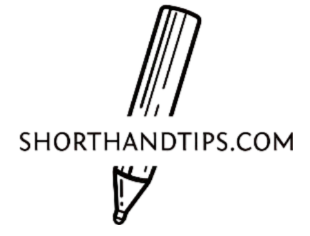Taking notes while meeting without losing essential information is challenging, especially when trying to note critical points accurately and quickly. In this case, English Shorthand plays a vital role.
English short is one of the most important skills for taking meeting notes faster without losing essential points.
So, in this brainstorming session, mastering English shorthand can be a game-changer for staying on top of your notes. In this article, I will teach you how to use English shorthand to take meeting notes without losing essential vital points.
Read More: How To Learn Shorthand In One Month? Step by Step Guide
Table of Contents
Toggle5 Benefits of Using Shorthand in Meetings
Here are five benefits of using English shorthand in meetings:
1. Increased Speed and Efficiency
Generally, we take notes in longhand writing, and in this way, we can miss many points. But shorthand is perfect for taking real-time meeting notes with fast voice speed. Shorthand will help you go as fast as possible. It saves time and the mental energy of typing out every word spoken verbatim, which lets you concentrate more on what is being said.
2. Enhanced Focus and Engagement
By removing all your writing backing from the discussion tree, you can participate in the meeting as a whole human being. It reduces how much you participated in the conversation to take notes, allowing for better listening and participation in discussion. It also helps you save yourself the trouble of constantly trying to keep up with your notes while focusing on what they say. It would enhance the meeting experience, as we would be more active in factful conversation instead of focusing on details.
3. Better Organization of Information
Shorthand helps organize your notes better. Because you use fewer words, it is easy to structure your notes with the most important categories and keynotes. Different types of content can be symbolized and abbreviated, for example, decision, Action Item(ai), or Key Points (KP). This organizational advantage is beneficial when you look back on your notes, where it’s easier to find this collected information versus dispersed throughout pages of seemingly non-relevant details.
4. Improved Accuracy
One of the most important benefits of using shorthand while taking meeting notes is that you can record more data in less time. Precise note-taking means fewer chances to forget any essential critical points of conversation. It makes you more likely to remember the information. Shorthand notes can often be more helpful for remembering what was discussed in the meeting than regular longhand notes, as seeing the shorthand symbols will trigger associations with what you discussed.
5. Professionalism and Competitive Edge
Taking notes in shorthand during meetings is a way to establish your credibility as an organized and detail-oriented person. In a fast-paced business environment, taking quick and accurate notes is a precious skill that will make you look good around your colleagues or superiors. By the same token, if you are good at shorthand, this could give you an upper hand in pressing situations where each second counts most — client meetings, interviews, or presentations, as a random example. It shows your A: dedication to clear communication and B: how you can juggle multiple issues without breaking into a sweat.
Real-Life Examples of Effective Note-Taking
Here are some real-life examples of effective note-taking in shorthand.
1. Journalist Covering a Press Conference

Journalists routinely take notes in press conferences that contain important details and critical facts and which come very quickly. Journalists take notes, frequently in shorthand, to get direct quotes and precise facts and details. A journalist, for example, at a government briefing or corporate announcement, might use shorthand to take all the notes.
2. The Student During a University Lecture

College lectures are often filled with professors who tend to absorb loads of information quickly. Students take notes to help them disorganize all this information and keep it in mind whenever they need further study. For instance, students taking notes about a sophisticated biology lecture may employ shorthand writing, figures, and sketches to record main points related to cell structures and mechanisms. Instead of going through audio files all night, it allows students to have a neat, concise version of what their professor wanted them to learn before an exam.
3. Meeting Time with the project manager

Project managers must convene a meeting to discuss several subjects and work deadlines. Taking proper notes, they can note important points like project timelines, assigned tasks, and critical decisions during meetings. A project manager could differentiate immediate action items from long-term goals using bullet points, abbreviations, and colour coding. This systematic way of taking notes helps not leave any stone unturned and makes a more logical reference for the following meetings, updates, etc.
4. Client meetings with a lawyer

Lawyers often talk with clients about their cases, what happened, etc., and provide legal advice. These consultations require effective note-taking when the consultant is most likely to note details of the case, client concerns, and potential strategies. In one example, a lawyer might take insightful shorthand notes to jot down the version of events mentioned by a client or some core evidence, which will help keep an organized and comprehensive case file. Prepare for court appearances, negotiations, and drafting up legal documents with accuracy & confidence.
5. As a healthcare professional, inpatient assessments

Patients must be assessed for symptoms, medical history, treatment plans, notes taken, etc. Good documentation saves the information you took before making available any time needed for accurate patient records while providing high-quality care. For example, suppose a nurse was conducting an intake assessment. In that case, they might quickly jot down shorthand or medical abbreviations to document symptoms and vital signs so that the documentation process would be done more efficiently. The doctor subsequently uses the notes to diagnose and prescribe treatment, leading to more effective patient outcomes and improvements in documentation for seamless communication within the healthcare team.
6. Legal Secretary Taking Dictation from an Attorney

As an attorney dictates a proposal for, let us say, a legal brief, his secretary is typing the draft paper. Good note-taking here means writing in shorthand or typing fast enough to render the words from the attorneys accurately. Efficient note-taking is crucial to writing good legal documents in short deadlines.
Final Words
Learning English Shorthand is undoubtedly beneficial in every professional field. It can significantly increase the efficiency of meeting notes. It helps you gather important details and outcomes, improving your concentration and organization for maintaining accuracy. So whether you’re a journalist, student, project manager, or even a lawyer/health professional, recording your conversations and logging the information allows quick access to that data at any moment. This will help you improve your communication and retention of knowledge, making a lasting impression with finalized edits.
